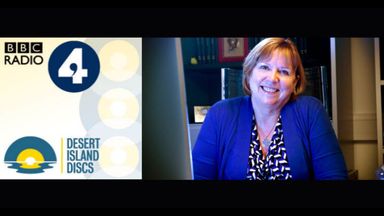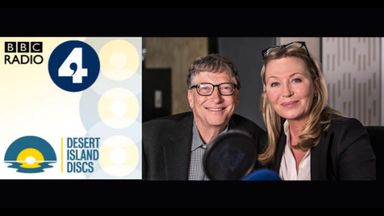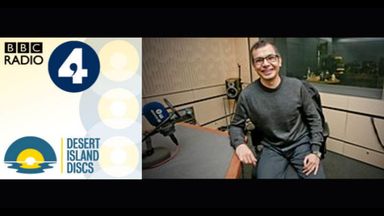Desert Island Discs
Dame Wendy Hall
Clips from this programme
Introduction-Kirsty Young interviews Computer Scientist Dame Wendy Hall, Fellow of both the Royal Academy of Engineering and the Royal Society. Algebraic topology, open hypermedia systems, a brilliant communicator on, what can seem to outsiders to be, impenetrable topics. The first in her family to go to University she rejected Cambridge, judging it "too stuffy". Passionate about web science, women in science and shopping
Duration: 00:54Dame Wendy Hall: If not a Computer Scientist, still a 'people person' but computers don't distance us. Social Networks like Twitter. Not a programmer but passionate about Computer Science
Duration: 01:55Desert Island Discs, Dame Wendy Hall - Music no 1: The Beatles, Things We Said Today
Duration: 01:07Dame Wendy Hall: The Web Observatory, mapping the Digital Planet, how the Web evolves and trends. The Right to expunge personal historical data on the web
Duration: 02:24Dame Wendy Hall: Born 1952, parents influenced by the war, father an accountant after the RAF, their first born had a budding flair for numbers: aged six she was charged with teaching a group of schoolmates maths, Brownies
Duration: 02:22Dame Wendy Hall: From Brownies, Prefect rebellion, Maths rather than medicine, The Joy of Pure Mathematics, thinking in N dimensions, in the abstract
Duration: 03:02Desert Island Discs, Dame Wendy Hall- Music no 4: Emerson, Lake & Palmer, Fanfare for the Common Man
Duration: 00:58Dame Wendy Hall: From Southampton, after PhD, teaching male engineers in 1977, Oxford Brookes, first brush with personal computers (Commodore Pet) for teaching Basic Programming. Inspired when BBC Micro Computer came out with pictures and video. Video Disc players with Video Discs, video onto the Apple Mac, Masters in Computer Science at Southampton University
Duration: 02:56Desert Island Discs, Dame Wendy Hall- Music no 5: George Frideric Handel, Arrival of the Queen of Sheba ( Royal Philharmonic Orchestra, Performer: Sir Thomas Beecham )
Duration: 01:51Dame Wendy Hall: Southampton, 1980s- Microcosm, a hypermedia system (before the World Wide Web WWW existed), links between multimedia content (1989 demo), (Tim Berners Lee in Cern), women still facing glass ceilings, Wendy became Professor of engineering
Duration: 03:19Dame Wendy Hall: Respect from merit, Men resent and feel threatened by confident women, no children, no career gap
Duration: 02:43Dame Wendy Hall: The positive future for the Web, managing our personal data, who manages the Internet for the good of humanity. Internet Governance. Openness and transparency, government responsibility & regulatory issues. Social Networks in the future, teleconferencing
Duration: 03:04Dame Wendy Hall: Desert Island Discs book choice: Complete printed out pages of Wikipedia (Kindles not allowed), luxury choice: Spa and favourite spa products
Duration: 01:03Desert Island Discs
Dame Wendy Hall
First broadcast: 1st August 2014
Duration 31:14
Fellow of both the Royal Academy of Engineering and the Royal Society, Dame Wendy fought long and hard to prove that her type of web science was highly significant and here to stay. If algebraic topology and open hypermedia systems really aren't your thing, Dame Wendy is also in demand as a brilliant communicator on, what can seem to outsiders to be, impenetrable topics. Her parents were from humble beginnings and it was clear from the get-go that their first born had a budding flair for numbers: aged six she was charged with teaching a group of schoolmates maths. The first in her family to go to University she rejected Cambridge, judging it "too stuffy". She says, "I get too excited about stuff. I love my life and am passionate about web science, women in science and shopping". Producer CATHY DRYSDALE
Now playing
Bill Gates
First broadcast: 31st January 2016
Duration 35:17
Kirsty Young interviews entrepreneur and philanthropist Bill Gates.
Demis Hassabis
First broadcast: 21st May 2017
Duration 36:00
Kirsty Young's castaway is Dr Demis Hassabis. An artificial intelligence researcher and co-founder and CEO of DeepMind, he is also a neuroscientist, a computer games designer, an entrepreneur, and in his youth, a world-class chess player. After taking his A Levels two years early, before going to university he worked on one of the most successful computer games of the 1990s, Theme Park. He graduated from Cambridge with a double first, and returned to the computer games industry, founding his own company in his early twenties. His passion had long been artificial intelligence and he says everything he's done has been part of a long-term plan to "solve intelligence" and then use intelligence "to solve everything else". He gained a PhD in Cognitive Neuroscience where he deliberately chose to study topics where AI had failed so far: memory and imagination. After stints at MIT and Harvard, he co-founded his company in 2010, which was then acquired by Google in January 2014. In March 2016 their computer programme, AlphaGo, beat a world champion Go player at the game having taught itself how to play through a combination of two techniques - deep learning and reinforcement learning.





















